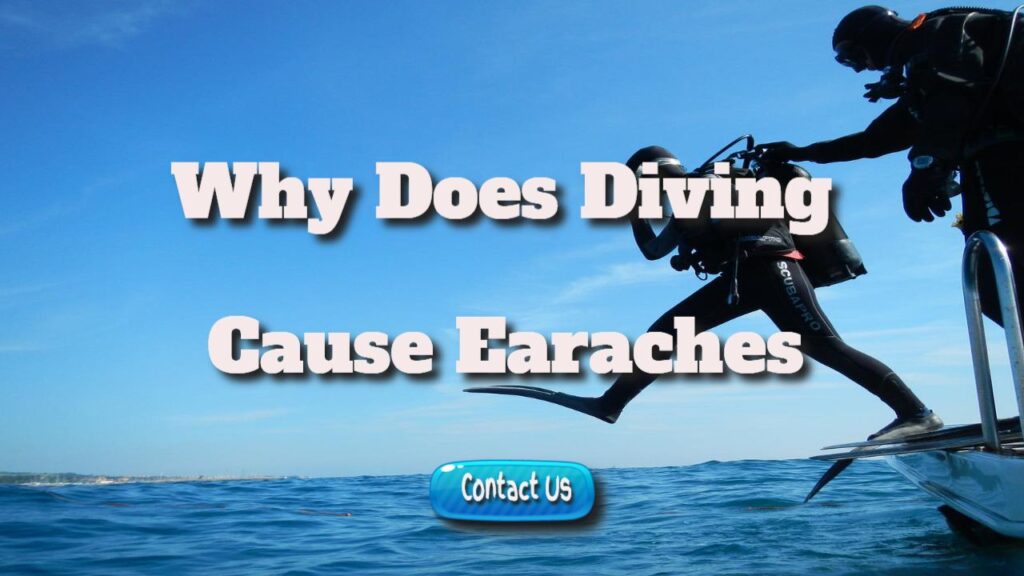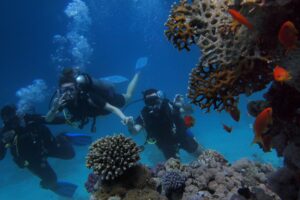Why Does Diving Cause Earaches
Why Does Diving Cause Earaches: Have you ever gotten to the bottom of a pool, and your ears started hurting? What you experienced was one of the most common diving problems: ear pain caused by a significant increase in water pressure. We’ll examine why your ears hurt and what you can do about it.
Divers are constantly subjected to this occurrence. The diving community has coined the term “ear pressure” to describe the sensation. The water pressure on divers’ eardrums increases as they descend to the ocean floor. The symptoms of ear pinch are caused by pressure on the eardrum.
As the eardrum swells and bulges, what begins as a feeling of fullness can quickly become very uncomfortable and dangerous. The eardrums may rupture if the pressure continues to rise. As a result, ice-cold seawater enters the middle ear and causes nausea, dizziness, and vomiting. This is a bad situation for a diver several feet below the surface.
Because divers usually dive far below the average depth of a public pool, this type of earache must be treatable. If you dive and experience ear pain, you mustn’t ignore it.
To avoid injury and permanent damage to your ears, you must understand how to free your ears and when to stop diving. So let’s get started right away.
When you dive, why do your ears hurt?
The ambient pressure rises dramatically as you dive deeper. Submarines require high pressure to avoid crushing when diving far below the surface. It’s the same with your ears.
Normal ear pressure is consistent with atmospheric pressure outside the ear. Then everything is fine, and you probably don’t think about it again.
When you dive, water is on the outside of your ear, and the air is on the inside – specifically, the middle ear (the middle ear is the area behind the eardrum).
Your body can equalise this pressure, but it must first reach the inner surface of the eardrum. That is the function of the Eustachian tube.
The Eustachian tube connects the ears to the nose and throat, opening and closing to regulate middle ear pressure. “Ear pressure” is felt when the Eustachian tube is not functioning correctly.
Ear injuries while diving is entirely avoidable. Before diving, you must learn how to equalise the pressure in your ears.
This phenomenon may be familiar to you from previous dives. If you’ve ever flown, you’ve probably experienced it in your ears. The air pressure around you changes when the plane takes off or lands. It is standard advice to chew gum while flying, and nothing is wrong with that. Jaw movement has the potential to open the Eustachian tube and help your ears equalise pressure.
What can aggravate ear pain?
Anything that can impair the Eustachian tube’s function increases the likelihood of ear pain while diving. Cold, other respiratory problems, and chronic sinus disease can all hurt Eustachian tube function. Allergy sufferers, including those suffering from hay fever, are also at risk. Smokers and those with pre-existing conditions such as nasal polyps or previous facial trauma are also at risk.
Note: Instructors should discourage prospective divers with respiratory illnesses or significant nose and sinus problems from diving.
Know the dangers of ear pain while diving.
Eardrum perforation is one of the most severe risks of ear pain while diving. If you experience ear pain while descending, follow this simple rule: stop and try to equalise the pressure. If this fails, the dive must be terminated, and you must return to the surface.
Suppose you cannot compensate for the pain in your ear and continue your descent. In that case, your eardrum will be perforated, resulting in additional risks such as disorientation, dizziness, and nausea – not something you want to experience underwater.
Because the eardrum can never fully recover after being perforated, you may experience recurring problems that prevent you from diving in the future.
Options for treating ear pain while diving
Ear pain from diving is typically temporary and resolves within a few days. We recommend that you see a doctor if the pain persists.
If the eardrum is perforated, it usually heals on its own without the need for medical attention. However, keeping the ear dry during healing is critical to avoiding a middle ear infection.
If you seek medical attention after the dive, the doctor will most likely ask you questions about the dive and your medical history (sinus problems and respiratory diseases).
The ear will then be thoroughly examined with an otoscope to determine the health of the eardrum. They will look for perforations and see if the eardrum is bulging or retracted, which could indicate a Eustachian tube dysfunction.
Hearing loss is another issue with perforated eardrums that must be monitored regularly. A visit to an audiologist may be recommended by your doctor, who can perform additional tests, such as a middle ear function test called a tympanogram, to provide more information about the health of the middle ear.
How can you avoid permanent ear damage while diving?
As previously stated, the most important preventive measure is to stop diving at the first sign of ear pain that cannot be relieved by decompression. It is critical to adhere to all recommended decompression stops when descending for this purpose.
If you suffer from sinus congestion and allergies, your doctor may prescribe oral or nasal decongestants, as well as antihistamines if allergies are present.
Suppose you continue diving despite ear pain and end up with a perforated eardrum. Taking antibiotics to prevent infection and scheduling an appointment with an audiologist are necessary next steps.
Surgery may be necessary if the perforation is too big to close. Because eardrum perforations are painful, you will also need to take acetaminophen.
In a nutshell, here are the facts about ear injuries and diving.
Ear pain is joint while diving and is caused by a difference in pressure between the middle ear and the external pressure during descent.
Pressure equalisation during decompression stops can usually prevent this pain, but pressure equalisation is not always possible.
This is usually caused by a Eustachian tube dysfunction associated with sinus problems caused by upper respiratory problems and allergies.
Sniffling and a runny nose are symptoms of a cold, so consult a doctor before diving and consider taking decongestants or antihistamines. If the symptoms persist, you should reconsider diving.
Suppose you experience ear pain and cannot compensate. In that case, stopping your descent and possibly aborting the dive is critical, as continuing to descend may result in further problems such as eardrum perforation, dizziness, disorientation, and nausea.
If your ear pain lasts more than a week after your dive, seek medical attention.
Brought To You By – Ear Wax Removal Pinner
The post Why Does Diving Cause Earaches appeared first on https://gqcentral.co.uk



Comments are closed